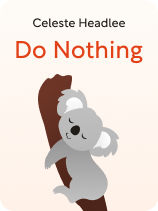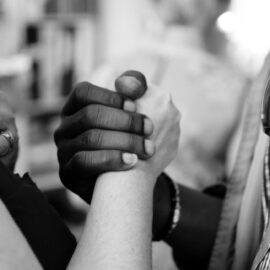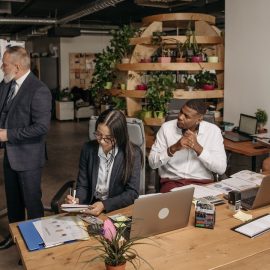

This article is an excerpt from the Shortform book guide to "Do Nothing" by Celeste Headlee. Shortform has the world's best summaries and analyses of books you should be reading.
Like this article? Sign up for a free trial here.
Are you a participant in today’s productivity culture? Are you ready to step off the treadmill and get a real life?
In Do Nothing, Celeste Headlee argues that, by trying to do too much, people are working less efficiently and suffering professionally and personally. She shares several tips for changing the way we work and making space in our life for leisure and human connection.
Keep reading for Headlee’s advice on how to start living a healthy lifestyle.
Start Living a Healthy Lifestyle
Given the negative consequences of a productivity-obsessed culture—the inefficiency and the tolls it takes on people’s minds and bodies—Headlee concludes that working more than we need to support ourselves simply isn’t good for us. She explains that she experienced many years of struggling financially as a single mother, and, even when her career started to provide financial stability and the flexibility of self-employment, it wasn’t enough to relieve her stress around work and time. She realized that it wasn’t her boss or her smartphone that fundamentally caused her problem but the cultural norms and expectations that encouraged her to willfully overwork herself.
(Shortform note: Headlee’s personal experience aligns with data showing that people who are self-employed tend to work more on average than people who aren’t. In addition to the cultural pressure Headlee refers to, this may also be because their earnings are more directly tied to the time they put into their work as opposed to someone who has a fixed salary or hourly rate.)
Based on her own experience making positive changes to the way she lives and works, Headlee advises on how to start living a healthy lifestyle—with ample leisure and social connection—by being more intentional about how you spend your time (she refers to these tidbits of advice as “life-backs,” as a play on the phrase “life hacks”).
(Shortform note: Although Headlee focuses on leisure and social connection as avenues for healthful living—especially for people who are overworking—many wellness experts differ in their view of what people need to achieve a healthy life. For example, in Ikigai, Héctor García and Francesc Miralles draw inspiration from the Okinawan people of Japan to define a set of guidelines for a long and happy life. They recommend practicing mindfulness techniques to decrease stress, doing mental exercises to revitalize the mind, doing physical exercises such as yoga and tai chi, and improving your diet by eating less food and more varied food.)
#1: Change Your Mindset About Productivity & Time
The first way to improve your mindset around productivity and time is to increase your awareness of how you spend your time. Headlee says that, by keeping a log of how you spend your day, you’re likely to discover that you have more time than you thought you had to get everything done. Realizing that you do have enough time to get all the essentials done will greatly reduce your stress levels and anxiety around time. It might also help you pinpoint aspects of your schedule you’d like to change—for example, if you notice that you spend far more time on social media or writing emails than you thought you did.
The next mindset shift Headlee describes is focusing on larger goals rather than the steps you take to achieve the goals. She explains that we often get too caught up in a goal’s metrics or stepping stones, to the point that we forget about the ultimate reason for doing something.
For example, perhaps you want to feel healthier, so you start a strict yoga class regimen. However, if missing a session makes you feel stressed, or you force yourself to go even when you don’t feel physically up for it, the activity can become counterproductive to your initial goal. Instead, it might be better for your health to keep the class schedule flexible and take days off when your body needs rest. Headlee says that while metrics can be helpful, remember that there are many ways of reaching a goal, so focus on what’s important to you in the long term.
#2: Change Your Scheduling & Work Habits
Headlee’s next tips are for changing your scheduling and work habits. Her first piece of advice is to do more focused work so that you can work fewer hours while getting the same amount done. If you have flexibility in your schedule, she recommends working for about 50 minutes at a time, followed by a short break to recharge.
Headlee also recommends not working any more than your job requires, since the accompanying stress and exhaustion from being overworked isn’t worth the career-related benefits you may or may not get from it.
Another work-related tip is to work in groups when you can. Headlee says that although many people feel that working independently is more efficient, research suggests that diverse groups are more efficient at problem-solving and making optimal decisions compared to individuals. Thus, collaborating with others can save you time and produce better results.
Lastly, create your dream schedule and include ample leisure time. Headlee says your dream schedule doesn’t have to be strictly followed, but writing it down will give you something to strive for. Remember to include leisure activities—anything that’s purely for enjoyment like going for a walk, reading outside, doing a craft, or playing music.
Having these periods of rest is essential because it improves mental health and activates a state of mind known as the default mode network (DMN). The DMN activates when your brain isn’t working on a task, and in this state, we naturally process emotions and decisions, reflect on memories, think about how others feel, and daydream about the future. Headlee says that the DMN sparks creativity and growth since our brain is free to consider things from new angles.
#3: Change How You Interact With Others
Headlee’s next set of advice for achieving a healthier life centers around your interactions with others. First, avoid making unhealthful comparisons about your productivity. Headlee asserts that your perception of how busy other people are is likely inaccurate anyway since many people try to outdo one another when it comes to busyness. In addition, she says that comparing yourself to someone online can be unhealthful because they might have a lifestyle that’s unobtainable—like celebrities, for example—and the comparison is more likely to make you feel bad than it is to inspire you.
(Shortform note: One way to let go of damaging social comparison is to engage in creative activities. According to Brené Brown’s The Gifts of Imperfection, doing activities like painting, drawing, creating new recipes, and writing fosters a sense of individuality and helps remind you of your unique skills (since no one will express things in quite the same way that you do).)
Another way to improve your well-being and avoid some of the pitfalls of overworking is to schedule social time and make an effort to interact in person with others. Headlee asserts that while many people use technology to avoid conversations and small talk with acquaintances and strangers, these small social interactions—like chatting with your mail carrier—improve your health and make you feel more relaxed. As we mentioned earlier, deeper relationships are also important, so set aside time to regularly catch up with friends and stay connected with loved ones.
(Shortform note: In Digital Minimalism, Cal Newport echoes Headlee’s assertion that in-person social time is crucial to well-being. However, given that technologies are integral to our lives, he argues that we can improve the impact of technology on our relationships by changing how we use devices to communicate. He recommends using text-based communication exclusively for planning and coordinating non-digital conversations and sharing simple logistic information. For example, instead of catching up with a friend via a messaging app, you would instead exchange messages to plan an in-person meetup.)
Headlee’s last recommendation is to do a small act of kindness every day to counteract the lack of social connection and mental-well being that overworking causes. This could include cooking a meal for someone, or something small like giving a sincere compliment. Acting kindly and generously toward others not only helps the recipient but also makes the person doing the act feel happier and less stressed. Headlee explains that humans are social creatures (we thrive in communities, not in isolation), so we evolved to receive psychological benefits from altruism, which increases social cohesion. Plus, these benefits have a ripple effect because the recipient is more likely to do something nice for someone else, too.
(Shortform note: Similar to the way altruism increases the chances of a community’s survival and provides mental health benefits, self-compassion improves an individual’s likelihood of survival due to its health benefits: One research study shows that acts of self-kindness lower your heart rate and reduce other bodily stress responses such as sweating, and this physical state of relaxation enables your body to heal faster.)

———End of Preview———
Like what you just read? Read the rest of the world's best book summary and analysis of Celeste Headlee's "Do Nothing" at Shortform.
Here's what you'll find in our full Do Nothing summary:
- How our fast-paced world is causing us to work less efficiently
- How the culture of overworking has led to social isolation and poor health
- How to embrace true leisure to live a happier and healthier life






